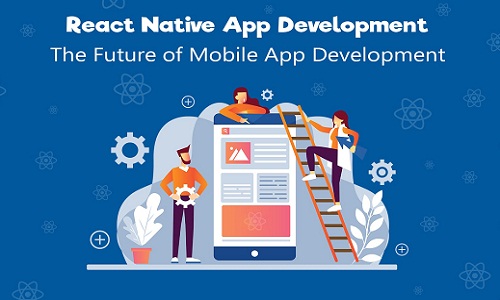
Table of Contents
Mobile app development demand holds a very powerful potential to lift the growth of the whole IT industry. According to Statista, the mobile app market revenue will reach $437.80 billion by the end of 2022. That is why many companies are opting to develop mobile applications to generate more revenues for their businesses.
Now to build applications the concept that is booming all around the world is cross-platform app development. Because it helps to develop mobile applications that run compatible with different operating systems.
Although there are many frameworks available in the market that can be used for cross-platform app development, among them React Native has gained a bit more popularity.
So, In this blog, we will discuss why you should consider it for your next mobile application. But before we dive in to know more about this, let’s first have a brief introduction to what React Native is.
What is React Native?
React Native is an open-source framework that uses JavaScript to develop native applications for different platforms such as Android and iOS. It was launched by Facebook in 2015. React Native is already very popular and is among the top-leading frameworks used for cross-platform app development.
However, it was first launched as an internal Facebook project in 2013 and then it was released for public use in 2015. And since then it has gained massive popularity because of its unique functionalities.
Some of its popularity stats include.
- According to the Stack Overflow Survey conducted in 2021, React Native got 14.51% among all the respondents in the category of the most popular frameworks.
- According to a Statista survey, 38% of the developers used React Native for cross-platform app development.
Advantages to Use React Native
1. Trusted Platform
React Native was developed by Facebook which is already a tech giant in the industry. And because of this since its launch, it has become one of the trusted platforms that is already used by many popular companies for their app development.
2. Use of JavaScript
React Native uses JavaScript as its primary programming language for React Native app development services. It is already very popular among developers and if you are already familiar with this language then you can seamlessly use it to develop React Native applications.
Even if you are a front-end developer who has never used React Native, you can still master it by investing some time in it because as a front-end developer it is apparent that you are already aware of JavaScript.
3. Hot-Reloading Feature
When you make any kind of changes in the code, one thing that you have to do every time is to reload the app to see the changes. It can be very time-consuming especially in situations when you have made very minor changes.
But React Native solves this problem very seamlessly through its “Hot-reloading” feature. The main motive behind “Hot-reloading” is that it keeps the app running and mobile app developers can see the changes they have made in the code without reloading the entire app again and again.
Although it has one demerit that should be kept in mind is that this feature will not work properly if you are in deep navigation. In this situation, you have to reload the entire app to see the changes in the code.
4. Comprehensive Libraries
React Native comprises pre-developed UI components which can be directly implemented because their codes are already written. These are helpful to save time and make the whole development process more efficient and faster. Some of these libraries include Shoutem, Jest, Mocha, and so on.
If in case you are not able to find the API or core component you are looking for, then, find and install it from the community to add that functionality to the application.
5. Easy Debugging Process
Debugging can be a very monotonous task for developers. If the code is not written properly, then it will take a long time to troubleshoot and resolve them. However, React Native uses the same code-base which makes the debugging process easier across multiple languages and platforms.
6. Community-Support
React Native has a large community support of experienced developers that are constantly providing new solutions for all the problems related to the app development process. Additionally, the community is continuously making new changes to improve the functionality of this framework.
7. Third-Party Plugins Support
There are many frameworks that do not allow the use of third-party plugins but React Native allows the incorporation of these plugins such as payment systems and maps to enhance the functionality of the application.
8 Cost-Effective
Normally you need different development teams for both iOS and Android platforms respectively if you are using a framework like Swift.
But as mentioned earlier, React native uses the same code base for different platforms and so it does not require two separate development teams. As only one team is more than enough to build the application for two distinct platforms. Ultimately, this also cuts down the cost of React Native app development and also makes the process quicker and more efficient.
Apps Built With React Native
Now let’s have a look at some of the most famous applications built by this framework.
Facebook is one of the most popular examples of React Native app development. It should be mentioned first on the list because Facebook developed React Native and they are the main force behind its development.
● Skype
Another example of a React Native app in the list is Skype. In 2017, Skype announced that it will be soon launching a new application based on React Native because its old version had a lot of performance and stability issues. In fact, they not only used that for mobile app development but also for the desktop version of the platform.
● Walmart
Walmart- the most famous American multinational retail corporation used React Native to build iOS and Android applications for their brand. After switching to this framework, the performance of their apps improved to the next level.
Another app that is integrated into React Native is Instagram. After this integration, the overall performance of the app has improved to a great extent.
Key Takeaways
- Code re-usability and cost-saving are its two most prominent benefits. It allows using the same code-base for both iOS and Android which in return ultimately saves development time and cost.
- It is a community-driven framework that offers a flexible development environment.
- It has pre-loaded elements that make the development procedure swifter.
- It has a large community of developers that are always ready to share their knowledge and expertise with other fellow developers.
- Last but not the least, it is growing rapidly and will definitely evolve more in the future as well.
Conclusion
To conclude, above are some of the reasons why you should consider React Native for your next project. But at the end of the day, app development is solely based on your business requirements. So if you want to use this framework, you can hire a React Native app development company that will help you to develop apps according to your specifications.




Thanks for sharing. I read many of your blog posts, cool, your blog is very good.